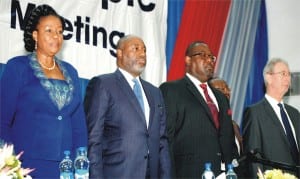Business
Jonathan Inaugurates Dev Bank Of Nigeria

L-R: Executive Director, Mobil Oil Nigeria Plc, Mrs Mayen Adetiba, Company Secretary, Mr Emmanuel Amade, Chairman/Managing Director, Mr Adetunji Oyebanji and Executive Director, Mr Alastair MacNaughton, at the company’s Annual General Meeting in Lagos, recently.
President Goodluck Jonathan, last Monday in Abuja inaugurated the Development Bank of Nigeria (DBN) in furtherance of his administration’s desire to revolutionise small businesses in the country.
Speaking at the event, Jonathan expressed optimism that the bank would eliminate all obstacles hindering the growth of Micro, Small and Medium Enterprises (MSMEs) and their ability to generate the much needed jobs for the country.
According to him, the DBN, which is a private sector driven financial institution, is meant to alleviate the financial constraints being experienced by operators of small businesses for rapid and sustainable national development.
“This launch of a brand new financial institution, the Development Bank of Nigeria (DBN), represents a defining milestone in our administration’s efforts to empower more micro, small and medium enterprises across our land?.
“MSMEs form the backbone of the Nigerian economy; the men and women who own and operate them are true reflections of the strong Nigerian spirit of enterprise and the vigorous work and ethics that define us as a nation and a people.
“Our recent GDP re-basing exercise confirmed the importance of MSMEs sector to our national economy.
“Currently Nigeria has over 17 million of these businesses, which contribute over 45 percent of our GDP and employ about 66 per cent of our labour force.
“Today we celebrate these great men and women, who keep our communities ticking with the impact of their hard work and practical ingenuity.”
Jonathan acknowledged the support of the nation’s development partners such as the African Development Bank (ADB); the World Bank; Agence Francaise de Development (afd), and KFW Entwicklungs Bank of Germany, saying that DBN would be a success story for Africa.
He said the government would ensure financial discipline and the adoption of international best practices in the operation of the bank.
“We are pleased that the DBN will not go the way of similar established institutions because of the participation we are getting not just about government putting money, but money from the private sector and especially from our development partners.
“We know that the ADB is a success story but our DBN will be a major success story for Africa,” he said.
He said that the bank would operate as a self-sufficient institution that would not rely on government subsidy, but source for funds to run its operations and also leverage on the existing structure of the financial sector.
He said: “Now is the time for us to achieve a rounded economic growth that will impact the lives of Nigerians.
“The MSMEs sector will be properly and strategically stimulated in a manner that is sustainable.”
According to the President, the challenges faced by the sector should be addressed in order to harness the benefits of development in terms of growth both in GDP and employment as well as leading the way for industries of the future.
He expressed the hope that DBN would stimulate “strong growth” in agriculture, manufacturing and among the micro, small and medium enterprises.
The President also expressed happiness that YouWin winners would look up to DBN to sustain the programme in terms of expansion.
The Minister of Finance, Dr Ngozi Okonjo-Iweala, said the bank would boost socio-economic activities across the country as it would guarantee long tenure funding for the Small, Medium Enterprises (SMEs),
She said that such businesses would have a grace period of five years before they would begin to repay the facilities.
?The Governor of the Central Bank of Nigeria (CBN), Mr Godwin Emefiele, said one of the objectives of DBN was to lend to specialised institutions such as the Bank of Industry, Bank of Agriculture and commercial banks for onward lending to SMEs.
Business
FIRS Clarifies New Tax Laws, Debunks Levy Misconceptions

Business
CBN Revises Cash Withdrawal Rules January 2026, Ends Special Authorisation

The Central Bank of Nigeria (CBN) has revised its cash withdrawal rules, discontinuing the special authorisation previously permitting individuals to withdraw N5 million and corporates N10 million once monthly, with effect from January 2026.
In a circular released Tuesday, December 2, 2025, and signed by the Director, Financial Policy & Regulation Department, FIRS, Dr. Rita I. Sike, the apex bank explained that previous cash policies had been introduced over the years in response to evolving circumstances.
However, with time, the need has arisen to streamline these provisions to reflect present-day realities.
“These policies, issued over the years in response to evolving circumstances in cash management, sought to reduce cash usage and encourage accelerated adoption of other payment options, particularly electronic payment channels.
“Effective January 1, 2026, individuals will be allowed to withdraw up to N500,000 weekly across all channels, while corporate entities will be limited to N5 million”, it said.
According to the statement, withdrawals above these thresholds would attract excess withdrawal fees of three percent for individuals and five percent for corporates, with the charges shared between the CBN and the financial institutions.
Deposit Money Banks are required to submit monthly reports on cash withdrawals above the specified limits, as well as on cash deposits, to the relevant supervisory departments.
They must also create separate accounts to warehouse processing charges collected on excess withdrawals.
Exemptions and superseding provisions
Revenue-generating accounts of federal, state, and local governments, along with accounts of microfinance banks and primary mortgage banks with commercial and non-interest banks, are exempted from the new withdrawal limits and excess withdrawal fees.
However, exemptions previously granted to embassies, diplomatic missions, and aid-donor agencies have been withdrawn.
The CBN clarified that the circular is without prejudice to the provisions of certain earlier directives but supersedes others, as detailed in its appendices.
Business
Shippers Council Vows Commitment To Security At Nigerian Ports
-

 Featured4 days ago
Featured4 days agoOil & Gas: Rivers Remains The Best Investment Destination – Fubara
-
Nation5 days ago
MOSIEND Calls For RSG, NDDC, Stakeholders’ Intervention In Obolo Nation
-
Nation5 days ago
Hausa Community Lauds Council Boss Over Free Medical Outreach
-

 Nation5 days ago
Nation5 days agoOgoni Power Project: HYPREP Moves To Boost Capacity Of Personnel
-
Nation5 days ago
Film Festival: Don, Others Urge Govt To Partner RIFF
-
Nation5 days ago
Association Hails Rivers LG Chairmen, Urges Expansion Of Dev Projects
-

 News5 days ago
News5 days agoNDLEA Arrests Two, Intercepts Illicit Drugs Packaged As Christmas Cookies
-

 News5 days ago
News5 days agoTroops Rescue 12 Abducted Teenage Girls In Borno

